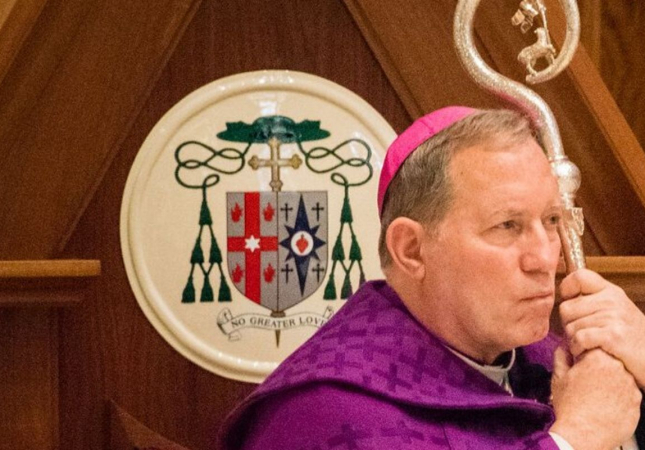
Lenten greetings to you all!
The Gospel for this fourth Sunday of Lent presents a man born blind. The people of the day connected his blindness to sinfulness – that because he was blind, he must have been a great sinner.
The story in the Gospel is more about a spiritual blindness than a physical blindness – the spiritual blindness of the Pharisees.
Not Just Physical Healing
The blind man received far more than physical sight. His own spiritual eyes were opened to a reality of far greater importance than being able to see the blue sky, or the green grass, or the colorful clothes that people might have been wearing.
His willing acceptance of Jesus’ gift of sight stands in contrast to the Pharisee’s unwillingness to see Jesus for who he was and what he offered them. The Pharisees were blinded by their own authority, their own arrogance, their need to be right… a self-imposed blindness. “There are none so blind as those who refuse to see,” Jesus said.
We All Have Spiritual Blindness
Jesus is reminding us of the ever-present dangers of spiritual myopia— a spiritual nearsightedness. God is ever present in our lives, gently nudging us to look at our own Pharisaic blindness, because he wants us to experience the fullness of his love. He wants us to live fully as Children of the Light.
And there is some kind of blindness in all of us
- It is often easier to see the faults in others, but have trouble finding them in ourselves.
- Some find endless fault with themselves and can’t seem to get past that obsession.
- Moral blindness had crept in our culture, keeping people from seeing moral truths.
- Some are apathetic, complacent, or just don’t care. “This is just the way I am. I’ve always been this way. Why should I change now?”
These are just a few forms of blindness. So often, we see what we want to see. Our reality is oftentimes based upon what we choose to perceive, instead of what God sees.
We have created blind spots which prevent us from seeing the truth… which means that like the Pharisees, these affect the way in which we ascertain certain facts. But as the Lord explained to Samuel, “Not as man sees does God see, because man sees the appearance but the Lord looks into the heart.”
We can hide nothing from the Lord.
Sin Casts Spiritual Darkness
We all know what the darkness of sin is like. We all know the spiritual darkness that sin casts over us. We may have difficulty adjusting or embracing what Jesus is offering us. We have become so comfortable with ourselves and our own spiritual blindness that as we are given new sight as to ourselves or our world, the change is difficult, sometimes uncomfortable, and sometimes there is a price to pay.
St. Paul says, “Take no part in the fruitless works of darkness; rather expose them….for everything exposed by the light becomes visible, for everything that becomes visible is light.”
Penance Lets in the Light
In this way we see the power of the Sacrament of Penance. To live more for Christ means that we have to sacrifice something in our own lives… that we want to seek life in a different way. It is hard work to see the way Jesus does… and to live the way Jesus does.
Lent is a perfect time for exposing our sins to the light, making our darkness known to our confessor in the Sacrament of Penance, dealing courageously with the lies that our own fears and insecurities have invented, and accepting the healing grace that our Lord wants to bestow upon us.
When driving, we all know what can happen when we don’t check our blind spots before changing lanes. When driving, I must look past the blind spot to see true reality. Yes, it takes a greater strain on the neck, but it also gives me a picture of true reality: that another car is there, or it isn’t.
Jesus’ Healing Helps us Grow in Faith
Blind spots in our spiritual lives can be serious impediments to our spiritual growth and happiness. They keep us from a deeper relationship with Jesus and experiencing his love in a deeper way. They can keep us mired in problems, emotional, psychological and spiritual, as well as unnecessary pain. Jesus brought the blind spots of the Pharisees to light. He wanted to heal them… it was his initiative.
In this season of Lent, we are invited to sit in prayer with the Lord, and look through our blind spots. The Lord will show us the true reality of what is there: namely, His love and mercy.
Have a blessed Lenten season!